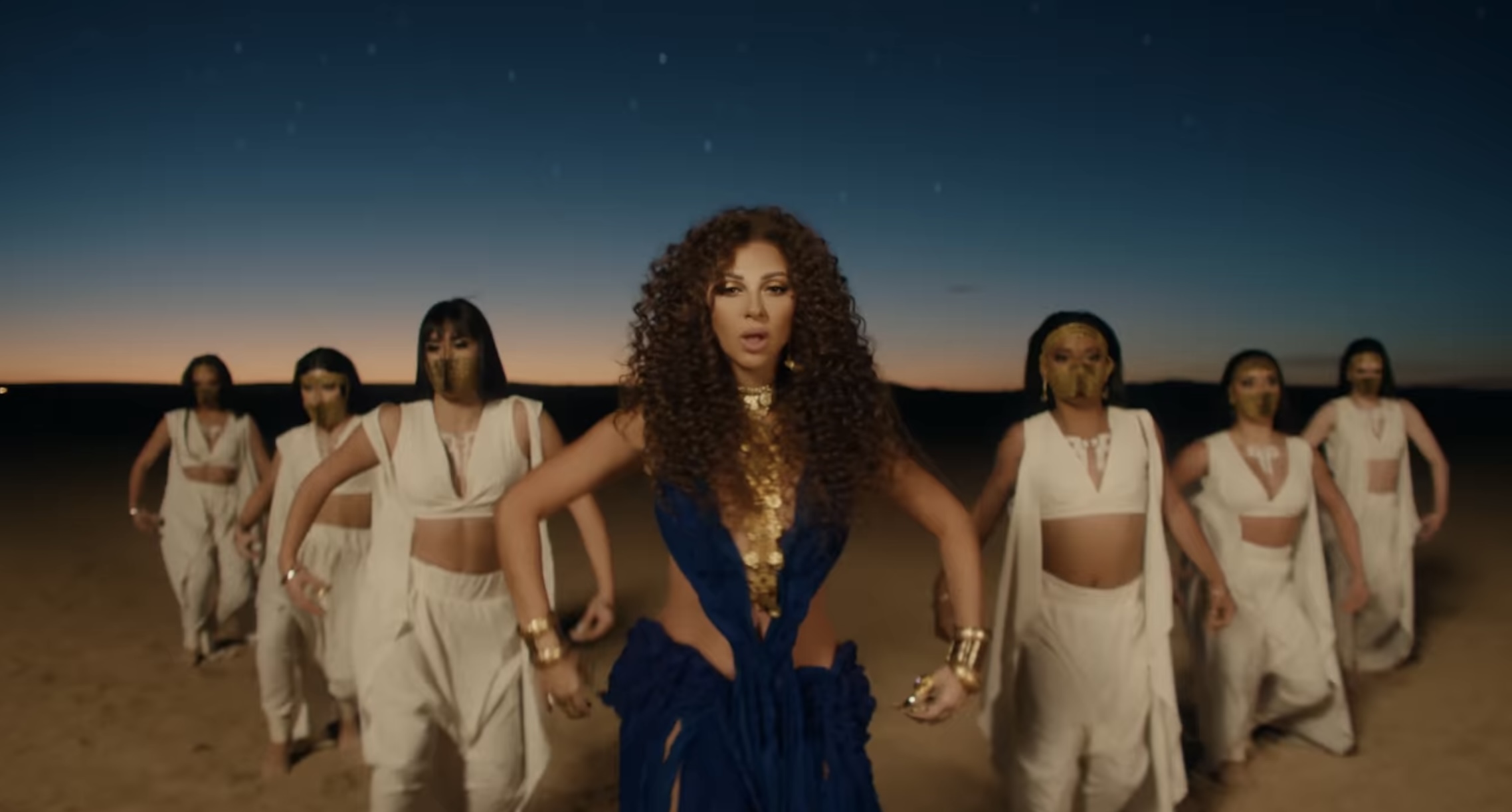From Queen’s iconic ‘We Are The Champions’ and Ricky Martin’s electric ‘The Cup of Life’, to Shakira’s ‘Waka Waka’ and K’naan’s instant classic, ‘Wavin’ Flag’ – anyone who follows football knows that the FIFA World Cup always comes with a few designated bangers to serenade the celebration of every win.
But while this year’s World Cup was one of the most unpredictable and satisfying we’ve seen in a long time in terms of football – in terms of bangers, I have to say it was a bit of a flop. Hayya Hayya (Better Together) by Trinidad Cardona, Davido, and AISHA was nice enough, though forgettable. Dreamers by K-Pop sensation BTS’ Jung Kook was the sort of flavourless pop that barely even registers on my musical radar.
The song that did, however, register on my radar with some clarity was ‘Tukoh Taka’. Performed by Trinidadian rapper Nicki Minaj, Colombian singer Maluma, and Lebanese singer and dancer Myriam Fares, the song made me, and quite a wide array of Arab viewers, do quite the double take.

‘Tukoh Taka’ – whatever that means – is the first World Cup song to ever be performed in Arabic, English, and Spanish. Fares, who proudly took credit for her part in the composition of the Arabic portion of the song, claimed in it some form of ambassadorship for Arab culture.
“I truly wish that ‘Tukoh Taka’ will be transmitting Eastern culture and Arabian music to the whole world,” she said in a joint statement with her fellow artists on the song.
Choosing to ignore the use of the words ‘Eastern’ and ‘Arabian’ – words that are Eurocentric and outdated respectively – her sentiment does appear to be noble. But if her intention was to bring Arab culture to the world, she unfortunately missed the mark by quite a way.
With vapid, caricaturised lyrics, a beat that sounds like what a Westerner thinks Arab beats sound like, and a video featuring backup dancers with their faces covered over a desert backdrop that would make Edward Said turn in his grave, nothing about this song represents Arab culture.
From earnest criticism to ridiculing memes, many Arab viewers received this song with either scorn or exasperation. One of the most widely viewed events came to the region, opening an opportunity for Arab music to take centre-stage, and all we got was this travesty.
The tournament moved on, and luckily for us, the euphoria that came with Morocco’s historic World Cup run took our minds right off Myriam Fares and her strangely choreographed dance. But as the final approached, hope in a World Cup banger was suddenly rekindled.
Enter Wegz, a young Egyptian rapper, currently far more relevant and successful in the region than Myriam Fares is, or perhaps ever even was. On 16 December, the 24-year-old artist released a song titled Ezz El Arab (Arab Glory).
With a beautifully-produced video featuring visuals and choreography that may not be described as traditional, but are a far more authentic representation of young people in the region, Wegz saved the day.
Perhaps it was the fact that he was performing alone and in Arabic, rather than beside two international artists in a multilingual song, that took some of the pressure off him and allowed him the space to create a song that was true to his style. While this does set Wegz’s song back in terms of worldwide reach, it almost ensures its success among young people in the region.
“Celebrate who united us, may no one ever divide us,” is the chorus line of the song, centering the togetherness transcending cultures that comes with the World Cup, as well as the kind of unity that sprouted unprompted whenever Arab teams performed well throughout the tournament.
What the other song’s chorus line, ‘Tukoh Taka’, even means remains a mystery to everyone I’ve spoken to so far. Some seem to think it is either Arabic for ‘knock knock’ – which it isn’t to the best of my knowledge – or a nod to ‘tiki-taka’, a playing style associated with coaches such as Pep Guardiola and Luis Enrique.
But I don’t buy it.
My best guess is that it is an overly forced and transparent attempt to emulate Shakira’s ‘Waka Waka’, which even in 2010 I was not too thrilled about, because why could they not just get an African musician to tell us that this time was for Africa?
I am not suggesting that Ezz El Arab is a perfect song either; it certainly is not. The avid praise of Qatar in the song did come across as inorganic, and frankly a little corny, and the lyrics were made up of the characteristically disjointed buzzy phrases associated with trap music in which I sometimes struggle to find coherence.
But then again, when were World Cup songs ever works of deep artistic reflection? If nothing else, Ezz El Arab succeeded in providing Arabs with a World Cup anthem they could dance to without cringing. And it certainly changed the rank taste of cheap Orientalism ‘Tukoh Taka’ had left in our mouths, replacing it with an authentic representation of Arab joy and youth culture in the region.
The opinions and ideas expressed in this article are the author’s and do not necessarily reflect the views of Egyptian Streets’ editorial team. To submit an opinion article, please email [email protected].







Comments (2)
[…] window.speakol_pid = 29 (adsbygoogle = window.adsbygoogle || []).push({}); Wegz Did What Myriam Fares Would Not: Why ‘Ezz El Arab’ Beats ‘Tukoh Taka’ […]
[…] = 29 (adsbygoogle = window.adsbygoogle || []).push({}); Wegz Did What Myriam Fares Would Not: Why ‘Ezz El Arab’ Beats ‘Tukoh Taka’ 112: Egypt Announces its Very-Own '911' Hotline for Public […]